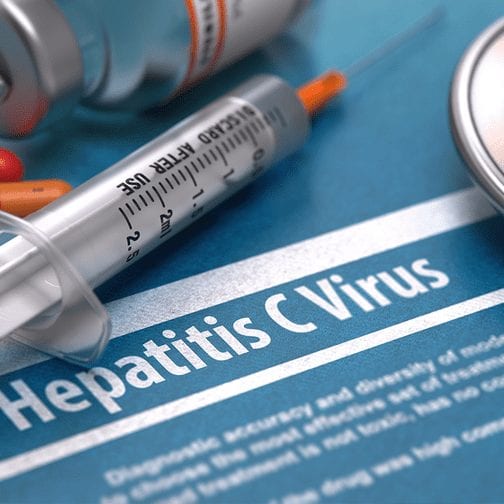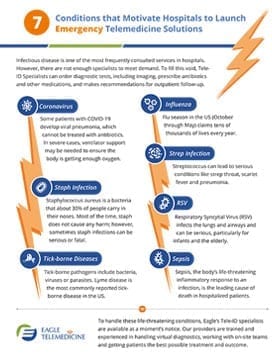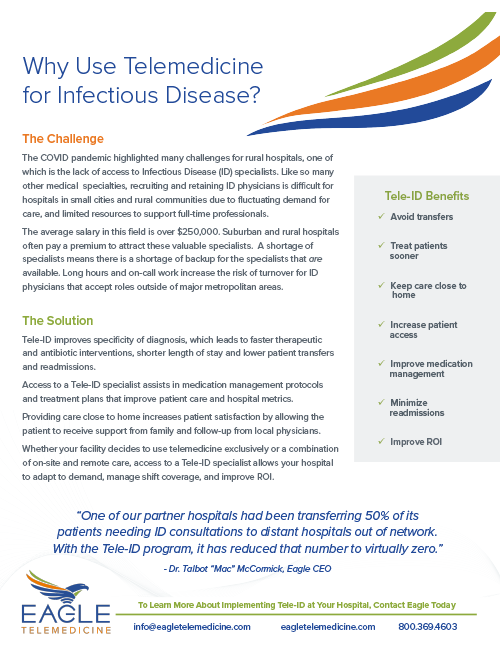During the pandemic, hospitals became acutely aware of the need and advantages of telehealth for Infectious Disease (ID) to support care for patients with COVID-19, especially those patients with complicated cases. But, hospitals have long needed ID specialists to manage aging and chronically ill patients with a variety of infectious diagnoses, including more rare infections.
For small community and rural hospitals, as well as suburban and inner city facilities, having an ID specialist on staff is not always possible. It’s one of the reasons why Long-Term Acute Care Hospitals see the value of telemedicine. Eagle’s Tele-ID specialists are ready to support these hospitals, available for consult at a moment’s notice – ensuring fast, accurate diagnosis and optimal treatment, and preventing the need for transfer to a tertiary care center often a considerable distance away.
A Broad Specialty Requires a Trained Eye
“Infectious disease” is a broad specialty, encompassing a vast array of infections from COVID-19, strep and staph, sepsis, soft tissue, Lyme disease, Norovirus and many more, including rare types brought to the US via global travel.
Dr. David Fitzgerald, a Tele-ID provider, has worked as an ID specialist for 12+ years, which included time in Africa where he gained insights into infections considered rare in the US.
“The range of conditions I see in my day-to-day in-person practice is everything from sepsis to osteomyelitis, diabetic foot infections, complicated pneumonia, c. difficile, bacteremias,” he explains. “Also, I’ll see newly diagnosed HIV patients, as well as those admitted with opportunistic infections. And immunocompromised patients with organ transplants or chemo, neutropenic fever.”
Dr. Fitzgerald also sees a variety of fungal infections, showing up in various geographical locations in the US where they are considered rare. He hasn’t seen coccidiomycosis since medical school 20 years ago; now he sees it every week in Texas and Arizona hospitals where he provides Tele-ID services. By working remotely Dr. Fitzgerald’s knowledge and experience with a vast array of infectious diseases can be leveraged by patients across the country. This is one of the advantages of telehealth — patients receive access to the specialist they need whenever and wherever the need arises.
Additional conditions a Tele-ID specialist can manage:
Hepatitis C
Hepatitis C often progresses with no symptoms. Hospitalized patients with symptoms like abdominal swelling, jaundice and bruising often receive a diagnosis from a Tele-ID specialist. Complications from hepatitis C virus (HCV) are a major public health challenge. The high death rate due to untreated Hepatitis C is caused by advanced liver disease and hepatocellular carcinoma. People living with this infection also use the healthcare system disproportionately for treatment of comorbidities — a significant financial burden on the healthcare system, particularly in acute hospital settings.
The good news is patients using direct-acting antiviral therapy can be cured, which can improve hospital-related outcomes and financial burden, over time. Eagle’s Tele-ID specialists can diagnose, treat and monitor these patients, ensuring they get the best treatment and most optimal outcome.
Norovirus vs. Salmonella or E. Coli
Foodborne illness can be caused by over 250 viruses, bacteria, and parasites, making diagnosis a greater challenge. Emerging microorganisms and toxins, antibiotic resistance, new methods of food production, and an increase in multistate outbreaks – these have also led to foodborne illness outbreaks.
Effects can range from mild to severe illness that requires hospitalization and diagnosis can require a battery of advanced tests. A seasoned tele-ID specialist will know immediately the diagnostics to quickly discern the pathogen and guide the on-site team in treatment protocols to control the illness, reduce hospitalization and improve outcome.
Pneumonia
Pneumonia is one of the most common infections in elderly patients, associated with increased mortality and morbidity due to cardiopulmonary disease and/or impaired host defenses. The clinical importance of pneumonias in the elderly relates to age-dependent and pathologic changes in the immune system as well as the lungs. Pneumonia diagnosis in the elderly may be difficult, due to pre-existing cardiopulmonary disease that mimics pneumonia.
All patients with pneumonia should be screened to detect the presence of pleural effusion, specialists say. If pleural effusion is more than minimal or loculated, thoracocentesis should be performed without delay. Examination of pleural fluid guides the management between observation, pleural drainage and surgery. Eagle’s Tele-ID providers can determine the surgical option best for each patient, to avoid a more invasive procedure that may not be necessary.
Skin and Soft Tissue Infection
Skin and soft tissue infections (SSTIs) include mild to serious life-threatening infections, including necrotizing fasciitis. In patients with comorbidities (diabetes and AIDS), the infection can advance very quickly. SSTIs require immediate attention and intervention, both medical and surgical, as needed.
Urinary Tract Infection
Urinary Tract Infections (UTI) are a very common medical condition, especially among female patients whose classic symptoms include painful or difficult urination and increased frequency of urination. However, patients may also be asymptomatic or have a mixed picture. While antibiotic treatment is necessary, selection of the antibiotic is very important since many of these infections are antibiotic resistant. Antibiotic resistance can result in gut and vaginal flora- related adverse effects. Specialists focus on controlling antibiotic use yet achieving good symptom control — the purview of an experienced Tele-ID provider.
Nosocomial UTIs
Upwards of 40% of UTI infections seen in hospital patients are hospital-acquired or nosocomial infections. These are a major drain on hospital resources, with high morbidity and mortality. Nosocomial infections are most common in patients with indwelling urinary catheters, or those undergoing urological procedures. Long-stay elderly male patients and others with debilitating diseases are at high risk of developing nosocomial UTIs. The organisms involved typically originate from patients’ intestinal flora, but may also come from a moist site within the hospital. These pathogens typically have a higher antibiotic resistance than simple UTIs. Eagle’s remote infectious disease providers are experienced in managing these complex patients for optimum outcome.
Long-Term Advantages of Telehealth Access to an Infectious Disease Specialist
To handle these complex conditions, Eagle’s infectious disease specialists become an integral part of a hospital’s care team. They work with on-site nurses, who help with patient exams. If wounds are involved, images are able to be sent instantly to the Tele-ID provider, as part of the patient’s medical record, in advance of the consult.
The patient’s medical history, x-ray and lab results are also available for secure, remote viewing in the hospital’s EMR, which Eagle providers have access to and use for documentation. Our telemedicine infectious disease providers communicate directly, via a secure phone or text app, with medical sub-specialists that are on the case, for real-time telemedicine consults with pulmonologists, cardiologists or nephrologists, as needed.
Exams are very comprehensive, including use of an electronic stethoscope that captures readings via thermal technology and transmits the data to the Tele-ID provider. This allows the remote provider to determine the status of vital organs, including heart, lungs, gastrointestinal system.
For the patient, the consult is very similar to an in-person physician’s visit. “It’s right at the bedside, just as if I’ve pulled up a chair,” says Dr. Fitzgerald. “Patients really appreciate it if we talk to them, so we show we’re paying attention to them, we’re listening and we’re not hurried. It really feels very natural, and the room is quiet so we can have a good conversation. We find it’s the one-on-one conversation they remember.”
Tailored to the Hospital’s Needs
Eagle has customized their Tele-ID services to meet a variety of hospital needs. For example, one hospital offers access to telemedicine in their clinic – one day per week when patients can schedule a consult with one of several tele-specialists. The advantages of telehealth for this clinic are vast. Tele-ID consult is included in that portfolio of specialties.
Patients that would not typically have access to specialist care in their community are able to receive follow-up medical consultations. And, the facility is able to avoid transferring patients to distant locations. “Tele-ID services allow smaller hospitals or even large hospitals to have a specialist available whenever they need it,” says Dr. Fitzgerald. “Multiple studies have shown that having an infectious disease consultant involved in the care decreases length of stay which decreases cost of care.”
He adds: “With a Tele-ID provider on staff, hospitals can improve both their antimicrobial stewardship and antibiotic utilization – and improve patient outcomes, especially with conditions like staph aureus bacteremias, which are often mishandled.
“I’ve seen many negative outcomes when patients were seen at a very small hospital with no infectious disease doctor. The doctors did what they thought was appropriate, but the infection becomes much more serious when it recurs.”
Long-term Advantages of Telehealth for Infectious Disease
Having an ID specialist on staff is not always possible. Eagle’s Tele-ID specialists are ready to support these hospitals, available for consult at a moment’s notice – ensuring fast, accurate diagnosis and optimal treatment, and preventing the need for transfer to a tertiary care center often a considerable distance away.









